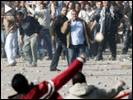
Democracy Now! correspondent Anjali Kamat reports on the festive atmosphere in Tahrir Square last night following a record-level turnout of protesters: “People are really taking care of each other very well, giving each other food, water and blankets. It was a very moving experience,” Kamat says. [includes rush transcript]
Transcript
AMY GOODMAN: Before we go to Robert Fisk, Anjali Kamat now joins us.
Anjali, it’s wonderful to have you with us, a Democracy Now! correspondent on the ground in Cairo. Last night you spent in Tahrir Square. Yesterday, one of the — if not the largest demonstration yet. Describe the scene.
ANJALI KAMAT: Amy, it’s great to be here, and it’s wonderful to have spent the night in Tahrir last night with 10,000 other people, at least. Throughout the day yesterday, there must have been well over a million people. The newspapers called it like the fourth million march. There’s so many people coming out.
And, you know, people have mentioned Wael Ghonim. A lot of people talk about how his interview on a local television station Monday night was a turning point in terms of bringing thousands and thousands of people, who might have otherwise grown tired of the protesters or lost their sympathy for the protesters, in terms of bringing all of them out onto the streets. There were thousands of families, lots and lots of little children. Children staged a march saying that they wanted President Mubarak to step down.
And spending the night in the square is a very different dynamic, because I assumed that the crowds would thin out very much. But to the contrary, there were, you know, at least 10,000 people in the square. And not very many people were actually sleeping. It was a very festive atmosphere. There was people singing in different groups. There was some dancing going on. All along the night, there were chants of ”Irhal,” asking Mubarak to leave. There were chants again of ”sha’b, yurid, isqat al nizam,” “The people want the regime to fall.”
And one of the most interesting things was seeing how well people take care of each other within the square. Nowhere is there — you know, this is a space, late at night, with thousands of men and hundreds and hundreds of women and children, and people are really taking care of each other very well, giving each other food, water and blankets. It was a very moving experience.
AMY GOODMAN: Thanks so much, Anjali. And we’ll continue to get reports from you on the ground. Democracy Now!’s Anjali Kamat in Cairo.













Media Options